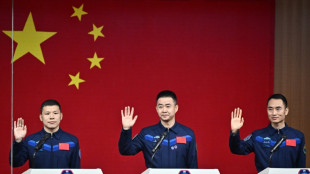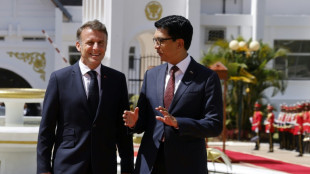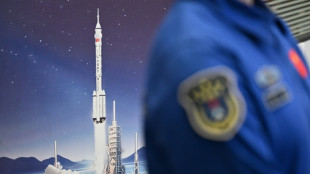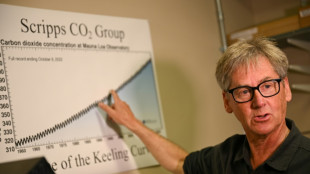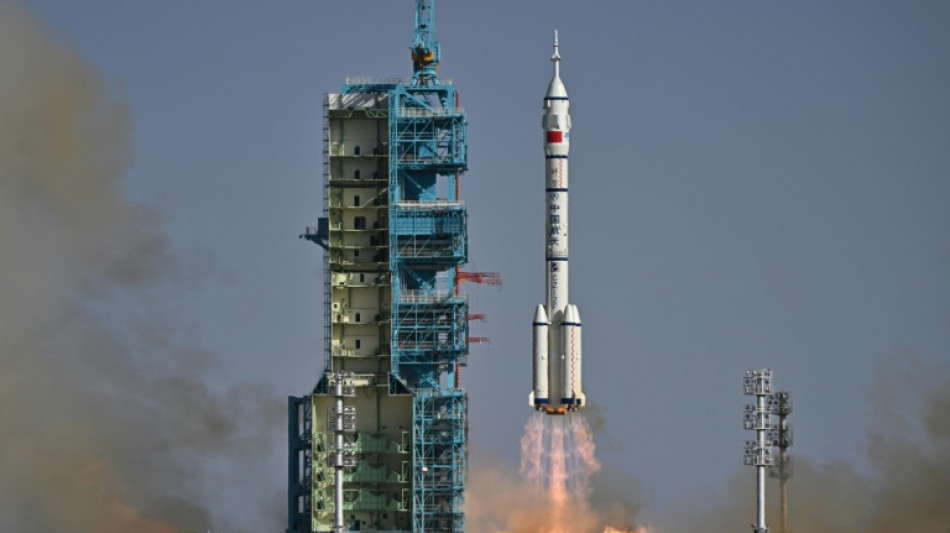

Three Chinese astronauts blast off for Tiangong space station
A Chinese rocket carrying three astronauts to the country's space station blasted off from its remote launch site Thursday, the latest milestone in Beijing's race to become a leading celestial power.
Beijing has pumped billions of dollars into its space programme in recent years in an effort to achieve what President Xi Jinping describes as the Chinese people's "space dream".
The world's second-largest economy has bold plans to send a crewed mission to the Moon by the end of the decade and eventually build a base on the lunar surface.
Thursday's launch of the Shenzhou-20 mission is intended to ferry a team of three astronauts to China's Tiangong space station.
The Long March-2F rocket lifted into the air in a plume of flame and smoke at the Jiuquan Satellite Launch Base in the desert of northwest China, AFP journalists saw, heralding the start of the six-month mission.
Leading the newest crew is Chen Dong, 46, a former fighter pilot and veteran space explorer who in 2022 became the first Chinese astronaut to clock up more than 200 cumulative days in orbit.
The other two crew members -- 40-year-old former air force pilot Chen Zhongrui, and 35-year-old former space technology engineer Wang Jie -- are embarking on their first space flight.
Hundreds of people brandishing bouquets and miniature national flags packed into the streets of the space base hours before the launch to see the astronauts off on Thursday afternoon.
A band played a rousing military march as the trio, clad in white spacesuits, waved in front of a red banner proclaiming: "Learn from our astronauts! Salute our astronauts!"
"We wish you success!" the crowd shouted in unison as the crew members passed.
Live images on state television then showed the three astronauts being transported by bus to the launch site, beyond which vast stretches of empty desert could be seen.
The crew will work on Tiangong for six months, carrying out experiments in physics and life sciences and installing protective equipment against space debris.
For the first time, they will also bring aboard planarians –- aquatic flatworms known for their regenerative abilities.
The team will also conduct spacewalks, replenish supplies and carry out general maintenance on the space station.
Three astronauts currently aboard Tiangong are scheduled to return to Earth on April 29 after completing handover procedures.
Busloads of space enthusiasts waited by a barren highway several hours ahead of Thursday's launch, braving the high desert sun to catch a glimpse of the rocket perched on the horizon.
A kiosk by the entrance to the launch base did brisk trade in toy rockets and mission-themed memorabilia.
- Jewel in the crown -
During a government tour on Wednesday afternoon, AFP journalists saw the rocket ensconced in a sky-blue launch tower, surrounded by red flags as workers in blue jumpsuits made final checks before the launch.
China's space programme is the third to put humans in orbit and has also landed robotic rovers on Mars and the Moon as it seeks parity with the world's two most established celestial powers, the United States and Russia.
Crewed by rotating teams of three astronauts every six months, Tiangong -- whose name means "celestial palace" in Chinese -- is the jewel in its crown.
China has been excluded from the International Space Station since 2011, when the United States banned NASA from collaborating with Beijing.
It has since sought to bring other countries into its space programme, and signed a deal with longtime ally Pakistan in February to bring the first foreign astronaut aboard Tiangong.
As part of this process, "two Pakistani astronauts will be selected to come to China for training", the CMSA confirmed on Wednesday.
A.Smith--VC




